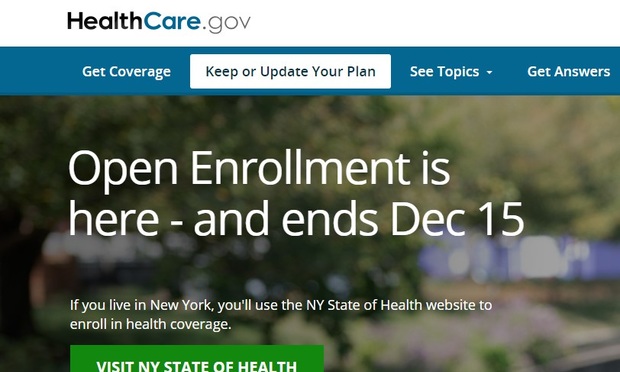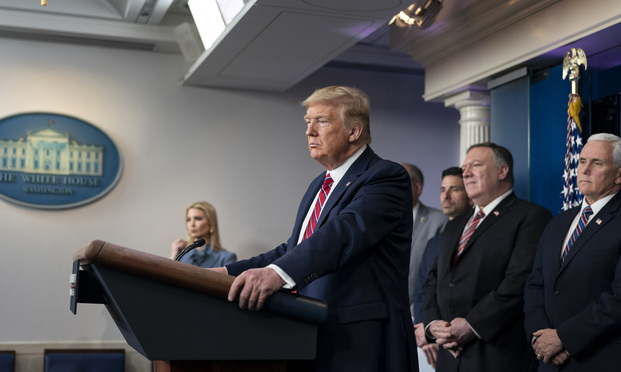
10. BELIEVE IT OR NOT, YOU CAN STILL SIGN UP FOR 2020 COVERAGE.
KFF SAYS: "Normally, people have just 60 days to apply for a special enrollment period after they lose other coverage, but during the pandemic, those who lost coverage at any time during 2020 can still apply for an SEP [special enrollment period] to get coverage for the remainder of this year. In 3 states (Maryland, New York, and the District of Columbia), all residents who are uninsured, no matter the reason, can still sign up for 2020 coverage." (Photo: ESB Professional/Shutterstock.com)
1. MORE PEOPLE ARE GOING TO NEED THE ACA THIS YEAR.
KFF SAYS: "While most people in the U.S. still rely on employer coverage, the ACA creates and expands programs (specifically, the Marketplaces and Medicaid Expansion), through which people without job-based benefits can access health coverage with financial help. Since these programs went into effect in 2014, though, the economy has been relatively strong until early 2020. As such, this year's Open Enrollment period could be the first real test of how well the ACA works to maintain coverage when large numbers lose their job-based health insurance."Heading into 2021, continued widespread economic dislocation during this COVID-19 emergency could mean millions of people may need Medicaid or private health insurance through the Marketplace who haven't needed that before. ... KFF has estimated that as many as 85% of people who are at risk of becoming uninsured due to loss of job-based coverage could be eligible for Medicaid or subsidized marketplace coverage." (Photo: Diego M. Radzinschi/ALM)

2. FEWER PEOPLE KNOW DETAILS ABOUT THE ACA.
KFF SAYS: "For example, 59% of the public knows the ACA offers subsidies for marketplace health plans, compared to 75% ten years ago. Among uninsured consumers today, understanding of ACA options and enrollment rules is more limited. Less than half (43%) know Open Enrollment is the time to sign up for Marketplace plans; and 14% of uninsured individuals living in states that have expanded Medicaid eligibility under the ACA know about this expansion. ... The Trump Administration has reduced funding for Open Enrollment marketing and outreach by 90 percent. In this environment, news coverage of Open Enrollment and the availability of financial assistance could have an even more significant impact on public education."
3. COVID-19 MAKES COVERAGE URGENT.
KFF SAYS: "A KFF analysis earlier this year showed that the cost of COVID-19 treatment for those requiring hospitalization could easily top ten thousand dollars, with more severe cases costing tens of thousands of dollars. Many private insurers have waived out-of-pocket costs for people needing COVID-19 treatment. At the very least, people with ACA-compliant private insurance are protected by out-of-pocket maximums, limiting how much enrollees must pay for a hospitalization. There is currently no guarantee that hospitals waive COVID-19 treatment costs for uninsured patients, meaning those without coverage could be on the hook for large medical bills."(Credit: Patuss89/Shutterstock.com)

4. NEW INSURERS AND DECREASING PREMIUMS
KFF SAYS: "On average, marketplace benchmark premiums are declining by more than 2% in 2021 across the country. In addition, new insurers are entering the Marketplace or expanding their service area in many states next year. These changes can increase plan choices and improve affordability for people who don't qualify for Marketplace subsidies."(Photo: enciktepstudio/Shutterstock.com)
Advertisement

5. INCOME VOLATILITY MAKES APPLYING FOR SUBSIDIES COMPLICATED.
KFF SAYS: "Those who have previously been told they were ineligible for Marketplace financial assistance or Medicaid may now find out they are eligible if their income or other household circumstances have changed. ... People who received Marketplace subsidies this year, will also have to report on income and sources when they file their 2020 tax return next year; [KFF's newly released 2021] FAQs provide information about how to count the $1,200 Recovery Rebate and federal supplements to weekly unemployment benefits that many received this year."(Photo: Lasse Kristensen – Fotolia)

6. STATES ARE TAKING THEIR OWN ACTIONS.
KFF SAYS: "Residents of two states that have been using HealthCare.gov – Pennsylvania and New Jersey – will need to sign up through new state-run Marketplaces for 2021 and will have a longer Open Enrollment period than they've been used to. Currently, 37 states have adopted and implemented Medicaid expansion and both Oklahoma and Missouri plan to implement expansion by mid-2021. Additionally, the Washington state exchange has implemented a new quasi-public option, called Cascade Care, which will be offered in half of the state's counties this year."(Photo: National Cancer Institute)

7. THE TRUMP ADMINISTRATION
KFF SAYS: "[R]ecent Trump Administration actions and court rulings ... may affect eligibility or covered benefits for some consumers. These include expanded exemptions for employers who refuse to cover contraceptive services based on religious or moral objections, and changes to the 'public charge' test for certain individuals applying for green card status who use certain government services." (Photo: Official White House Photo by Shealah Craighead)
8. THERE'S HELP—IT JUST MIGHT BE HARD TO FIND.
KFF SAYS: "Consumers in most states can get help from trained experts (Navigators) who won't try to sell them anything. However, federal government funding for Navigators remains limited, with no funding for Navigators in South Carolina or Utah. In several other states, including Texas, Ohio, Illinois, Kansas, and Michigan, many counties will not be served by federal navigator programs. KFF finds nearly 5 million consumers tried to find enrollment help during the last Open Enrollment but could not."(Photo: Berkeley Communications)

9. AFFECTED BY COVID OR OTHER NATURAL DISASTERS? APPLY FOR AN EXTENSION.
KFF SAYS: "As in past years, people who live in FEMA-designated areas affected by hurricanes, wild fires, or other disasters – can get more time to sign up for 2021 coverage if you are unable to enroll by the end of Open Enrollment. This extension may also be available to residents throughout the US who are unable to sign up on time due to the COVID-19 disaster. The time extension is not automatic, and must be requested from the Marketplace call center."(Photo: Mattias Bokinge/Shutterstock.com) Credit: Mattias Bokinge/Shutterstock.com
Advertisement

10. BELIEVE IT OR NOT, YOU CAN STILL SIGN UP FOR 2020 COVERAGE.
KFF SAYS: "Normally, people have just 60 days to apply for a special enrollment period after they lose other coverage, but during the pandemic, those who lost coverage at any time during 2020 can still apply for an SEP [special enrollment period] to get coverage for the remainder of this year. In 3 states (Maryland, New York, and the District of Columbia), all residents who are uninsured, no matter the reason, can still sign up for 2020 coverage." (Photo: ESB Professional/Shutterstock.com)
1. MORE PEOPLE ARE GOING TO NEED THE ACA THIS YEAR.
KFF SAYS: "While most people in the U.S. still rely on employer coverage, the ACA creates and expands programs (specifically, the Marketplaces and Medicaid Expansion), through which people without job-based benefits can access health coverage with financial help. Since these programs went into effect in 2014, though, the economy has been relatively strong until early 2020. As such, this year's Open Enrollment period could be the first real test of how well the ACA works to maintain coverage when large numbers lose their job-based health insurance."Heading into 2021, continued widespread economic dislocation during this COVID-19 emergency could mean millions of people may need Medicaid or private health insurance through the Marketplace who haven't needed that before. ... KFF has estimated that as many as 85% of people who are at risk of becoming uninsured due to loss of job-based coverage could be eligible for Medicaid or subsidized marketplace coverage." (Photo: Diego M. Radzinschi/ALM)

2. FEWER PEOPLE KNOW DETAILS ABOUT THE ACA.
KFF SAYS: "For example, 59% of the public knows the ACA offers subsidies for marketplace health plans, compared to 75% ten years ago. Among uninsured consumers today, understanding of ACA options and enrollment rules is more limited. Less than half (43%) know Open Enrollment is the time to sign up for Marketplace plans; and 14% of uninsured individuals living in states that have expanded Medicaid eligibility under the ACA know about this expansion. ... The Trump Administration has reduced funding for Open Enrollment marketing and outreach by 90 percent. In this environment, news coverage of Open Enrollment and the availability of financial assistance could have an even more significant impact on public education."
3. COVID-19 MAKES COVERAGE URGENT.
KFF SAYS: "A KFF analysis earlier this year showed that the cost of COVID-19 treatment for those requiring hospitalization could easily top ten thousand dollars, with more severe cases costing tens of thousands of dollars. Many private insurers have waived out-of-pocket costs for people needing COVID-19 treatment. At the very least, people with ACA-compliant private insurance are protected by out-of-pocket maximums, limiting how much enrollees must pay for a hospitalization. There is currently no guarantee that hospitals waive COVID-19 treatment costs for uninsured patients, meaning those without coverage could be on the hook for large medical bills."(Credit: Patuss89/Shutterstock.com)

4. NEW INSURERS AND DECREASING PREMIUMS
KFF SAYS: "On average, marketplace benchmark premiums are declining by more than 2% in 2021 across the country. In addition, new insurers are entering the Marketplace or expanding their service area in many states next year. These changes can increase plan choices and improve affordability for people who don't qualify for Marketplace subsidies."(Photo: enciktepstudio/Shutterstock.com)
Advertisement

5. INCOME VOLATILITY MAKES APPLYING FOR SUBSIDIES COMPLICATED.
KFF SAYS: "Those who have previously been told they were ineligible for Marketplace financial assistance or Medicaid may now find out they are eligible if their income or other household circumstances have changed. ... People who received Marketplace subsidies this year, will also have to report on income and sources when they file their 2020 tax return next year; [KFF's newly released 2021] FAQs provide information about how to count the $1,200 Recovery Rebate and federal supplements to weekly unemployment benefits that many received this year."(Photo: Lasse Kristensen – Fotolia)

6. STATES ARE TAKING THEIR OWN ACTIONS.
KFF SAYS: "Residents of two states that have been using HealthCare.gov – Pennsylvania and New Jersey – will need to sign up through new state-run Marketplaces for 2021 and will have a longer Open Enrollment period than they've been used to. Currently, 37 states have adopted and implemented Medicaid expansion and both Oklahoma and Missouri plan to implement expansion by mid-2021. Additionally, the Washington state exchange has implemented a new quasi-public option, called Cascade Care, which will be offered in half of the state's counties this year."(Photo: National Cancer Institute)

7. THE TRUMP ADMINISTRATION
KFF SAYS: "[R]ecent Trump Administration actions and court rulings ... may affect eligibility or covered benefits for some consumers. These include expanded exemptions for employers who refuse to cover contraceptive services based on religious or moral objections, and changes to the 'public charge' test for certain individuals applying for green card status who use certain government services." (Photo: Official White House Photo by Shealah Craighead)
8. THERE'S HELP—IT JUST MIGHT BE HARD TO FIND.
KFF SAYS: "Consumers in most states can get help from trained experts (Navigators) who won't try to sell them anything. However, federal government funding for Navigators remains limited, with no funding for Navigators in South Carolina or Utah. In several other states, including Texas, Ohio, Illinois, Kansas, and Michigan, many counties will not be served by federal navigator programs. KFF finds nearly 5 million consumers tried to find enrollment help during the last Open Enrollment but could not."(Photo: Berkeley Communications)

9. AFFECTED BY COVID OR OTHER NATURAL DISASTERS? APPLY FOR AN EXTENSION.
KFF SAYS: "As in past years, people who live in FEMA-designated areas affected by hurricanes, wild fires, or other disasters – can get more time to sign up for 2021 coverage if you are unable to enroll by the end of Open Enrollment. This extension may also be available to residents throughout the US who are unable to sign up on time due to the COVID-19 disaster. The time extension is not automatic, and must be requested from the Marketplace call center."(Photo: Mattias Bokinge/Shutterstock.com) Credit: Mattias Bokinge/Shutterstock.com
Advertisement

10. BELIEVE IT OR NOT, YOU CAN STILL SIGN UP FOR 2020 COVERAGE.
KFF SAYS: "Normally, people have just 60 days to apply for a special enrollment period after they lose other coverage, but during the pandemic, those who lost coverage at any time during 2020 can still apply for an SEP [special enrollment period] to get coverage for the remainder of this year. In 3 states (Maryland, New York, and the District of Columbia), all residents who are uninsured, no matter the reason, can still sign up for 2020 coverage." (Photo: ESB Professional/Shutterstock.com)The Affordable Care Act open enrollment period for 2021 has been under way since Nov. 1 and ends Dec. 15, although that period will be longer in ten states, including California, Nevada, and Pennsylvania. With the COVID-19 pandemic still raging and temporary job losses becoming permanent by summer's end, the ACA safety nets are expected to be sorely tested. "The ACA provides an important cushion," said Sara Collins, vice president for health care coverage and access at the Commonwealth Fund, in October, "but we don't know how much of one yet, since this is first real test of the law as a safety net in a serious recession." According to the Kaiser Family Foundation, people who have lost job-based coverage may feel more motivated now to enroll in ACA programs such as the Marketplace and expanded Medicaid subsidies. At the same time, people may need to refresh their knowledge about these programs, as awareness of their existence has decreased since 2014. "With so much changing this year, there is no shortage of reasons why the public needs to know about ACA open enrollment," write Cynthia Cox, Karen Pollitz, and Daniel McDermott in a new report for KFF. From declining premiums to extensions and eligibility changes, see our slideshow of KFF's top ten reasons to keep an eye on the 2021 ACA enrollment.
NOT FOR REPRINT
© 2025 ALM Global, LLC, All Rights Reserved. Request academic re-use from www.copyright.com. All other uses, submit a request to asset-and-logo-licensing@alm.com. For more information visit Asset & Logo Licensing.
Richard Binder
Richard Binder, based in New York, is part of the social media team at ALM. He is also a 2014 recipient of the ASPBE Award for Excellence in the Humorous/Fun Department.







